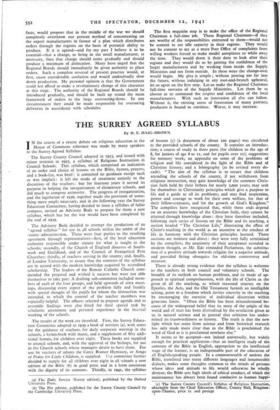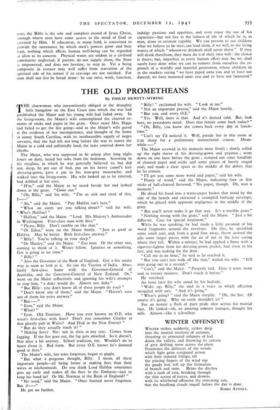THE SURREY AGREED SYLLABUS
By H. E. HAIG-BROWN
T N the course of a recent debate on religious education in the
I House of Commons reference was made by many speakers to the Surrey Agreed Syllabus.
The Surrey County Council adopted in 1923, and issued with minor revision in 1925, a syllabus of Religious Instruction in Council Schools. This syllabus, which comprised an indication of an order and choice of lessons on the Bible, hymns, prayers, and a book-list, was brief : it contained no guidance except such as was implicit: it left the mode of treatment entirely to the discretion of the teachers : but for fourteen years it served its purpose in helping the reorganisation of elementary schools, and did much to compose animosity. The progress of reorganisation, and the legislation of 1936, together made the provision of some- thing more ample necessary, and in the following year the Surrey Education Committee, having decided to issue a syllabus of fuller compass, invited an Advisory Body to prepare for them a new syllabus, which but for the war would have been completed by the end of 1939.
The Advisory Body decided to attempt the production of an
agreed syllabus " for use in all schools within the ambit of the ,:ounty administration. There were four parties to the resulting Igreement through representatives—first, of the local education authority responsible under statute for what is taught in the schools; secondly, of the Church of England dioceses of South- wark and Guildford, and of the Council of Evangelical Free Churches; thirdly, of teachers serving in the county; and, finally, of London University, to assure that the contents of the syllabus are in accord with the modern knowledge acquired by accredited scholarship. The leaders of the Roman Catholic Church com- mended the proposal and wished it success but were not able themselves to take part. A drafting sub-committee included mem- bers of each of the four groups, and held upwards of sixty meet- ings, discussing every aspect of the problem fully and frankly with special thought of the pupils for whom the instruction was intended, to which the counsel of the teacher members was especially helpful. The officers selected to prepare agenda and to assemble findings were also fitted for their special task by scholastic attainment and personal experience in the internal working of the schools.
The results of the work are threefold. First, the Surrey Educa- tion Committee adopted in 1939 a book of services (a), with notes for the guidance of teachers, for daily corporate worship in the schools, a hymn-book with music, and a supplement of fifty addi- tional hymns, for children over eight. These books are supplied to council schools, and, with the approval of the bishops, for use in the Church schools whose managers desire to have them. For use by teachers of infants the Carey Bonner Hymnary, or Songs of Praise for Little Children, is supplied. The committee further decided to supply for all children over eight in all schools a new edition of the Bible (b) in good print and in a form consistent with the dignity of its contents. Thirdly, in 1941,. the syllabus
(a) The Daily Service (Surrey edition), published by the Oxford University Press.
(b) The Pitt edition, published for the Surrey County Council by the Cambridge University Press.
of lessons (c) (a document of about ioo pages) was circulated to the provided schools of the county. It contains an introduc- tion; a course of study in three parts (for children to the age of 8, for juniors of age 8 to ix, and for pupils over it); suggestions for memory work; an appendix on some of the problems of religion and life considered in the light of the Bible and of Christian history; and a bibiography (to be revised every de- cade). " The aim of the syllabus is to secure that children attending the schools of the county, if not withdrawn from religious instruction, may gain knowledge of the common Chris- tian faith held by their fathers for nearly 2,000 years; may seek for themselves in Christianity principles which give a purpose to life and a guide to all its problems; and may find inspiration, power and courage to work for their own welfare, for that of their fellow-creatures, and for the growth of God's Kingdom." The compilers have •recognised that, while these ends depend on an accurate knowledge of the Christian faith, they cannot be attained through knowledge alone: they have therefore included, following each series of lessons on the Bible and its teaching, a section headed " The Christian Life," illustrating the effect of Christ's teaching in the world as an incentive to the conduct of life in harmony with the Christian principles learned. These sections are intimate and direct: they were very fully scrutinised by the compilers; the unanimity of their acceptance revealed in modern thought, as Mr. Ede reminded Parliament, the substitu- tion of a positive attitude towards religion for a negative attitude, and provided fitting obsequies for old-time controversy and mistrust.
There is already strong evidence that the syllabus is welcome to the teachers in both council and voluntary schools. The breadth of its outlook on human problems, and its mode of ap- proach to spiritual comprehension, with the life of Christ as the pivot of all the teaching, to which reasoned courses on the Epistles, the Acts, and the Old Testament furnish an intelligible setting, point to a freedom which invites sincerity in the teaching by encouraging the exercise of individual discretion within generous limits. " Often the Bible has been misunderstood be- cause of the widespread belief that its story of the origin of the world and of man has been discredited by the revelation given to us in natural science and in general that criticism has under- mined its trustworthiness as history_ The truth is that the new light which has come from science and from historical research has only made more clear that in the Bible is proclaimed the word of God as it is proclaimed nowhere else."
It seems to be accepted—not indeed universally, but widely enough for practical application—that an intelligent study of the contents of the Bible in English, appropriate to the intellectual stage of the learner, is an indispensable part of the education of all English-speaking people. In a commonwealth of nations the Bible, translated into many different languages and innumerable dialects, makes some thoughts common to the minds of persons whose ideas and attitude to life would otherwise be wholly diverse; the Bible sets high ideals of ethical conduct, of which the maintenance has always been found conducive to human happi-
(c) The Surrey County Cot nciTs Syllabus of Religious Instruction, obtainable from the Chief Education Officer, County Hall, Kingston- upon-Thames, price is. and postage ness; the Bible is the sole and complete record of Jesus Christ, indulge passions and appetites, and even enjoy the use of his through whom men have some access to the mind of God as capacities—but not live in the fulness of life of which he is, as revealed by Him. If education, as many hold, is concerned to man, alone in creation capable. We can present to our children provide the sustenance by which men's powers grow and bear what we believe to be true; can lead them, if we will, to the living fruit, nothing which affects human well-being can be regarded waters of which " whosoever drinketh shall never thirst." If they as alien to its concern. Physical wants are seldom in a civilised will drink therefrom, they must do it of their own will: the choice community neglected; if parents do not supply them, the State is theirs; but, imperfect as every human effort may be, we shall is empowered, and does not hesitate, to step in. Yet a being surely have done what we can to remove from ourselves the re- composite in essence may well suffer from starvation of the proach of a worldly and material generation, whose children sit spiritual side of his nature if its cravings are not satisfied. For in the markets saying " we have piped unto you and ye have not man shall not live by bread alone: he can exist, work, function, danced; we have mourned unto you and ye have not lamented."



























 Previous page
Previous page